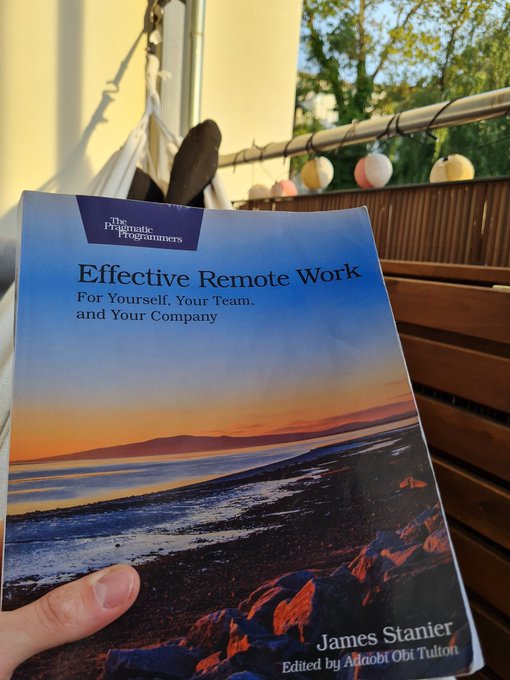I enjoyed reading “Effective Remote Work” by James Stanier. I wrote down my lessons learned and posted them on Twitter and LinkedIn. Surprisingly, the response was very positive which make me very happy. So I made a blog post out of the content to make it persist and easier to find later.

Lessons Learned
- The most fundamental principle is to treat everyone as remote. Period. Once again: Treat everyone as remote. That affects everything: tools, meeting setup, information exchange, communication, documentation, and opportunities.
- A key ingredient is to rely on asynchronous communication and to produce artifacts. Ideally, those artifacts should be developed collaboratively and shared with everyone. Every meeting should create an artifact (ideally, a shared document or at least a record).
- On the importance of connecting as humans in a remote setup: We are all human beings and need social interaction to not feel isolated and to enjoy the feel-good aspects of work. So you should break the asynchronous-communication-rule occasionally, have face-time, and make room for socializing.
- “When leaders make time for fun, it gives permission for others too”.
- And a little ‘How are you feeling?' goes a long way.
- On onboardings: Have a dedicated “Contracting Session” where the manager and the new report answer questions about how they like their relationship.
- I also like the idea of achieving e-mails instead of just marking them as read. “Empty inbox, empty mind, pure bliss”. I will give that a try!
- I also want to try out the proposed daily journaling. Close each day with a short reflection and write down your findings. Research has shown that this improves your performance.
- Inspirational: James explains why you should be brave and put boundaries between your work time and your personal time. I like the notion of strengthening your muscle of stepping away by “just doing it”. Step. Go!
- As a manager, you should over-communicate. Why? Because repetition makes your message stick, and your message will be missed by someone at some time anyway.
- James proposes a “Remote Working Test” similar to the Joel test. A couple of questions to find out if a company is remote-friendly. One question stuck in my head: Are the members of the executive team remote workers? If yes, they will improve the remote experience for all.
- I also like the idea of writing a team handbook. In our last team, we created something similar, and I wrote a blog post about it. I believe every guild/CoP should produce artifacts to avoid becoming a chit-chat round. GitLab’s Handbook is an excellent reference for that kind of handbook. They also wrote a lot about remote work.
- I appreciate that James creates awareness of the negative impact remote work can have on our physical and mental health, like a bad diet, lack of movement, overwork, stress, social isolation, and burnout. This is real.
That’s it! I really enjoyed James’ book, learned a lot, and got many new impulses from it.
Further Reading
from Hacker News https://ift.tt/Rpajf9v
No comments:
Post a Comment
Note: Only a member of this blog may post a comment.